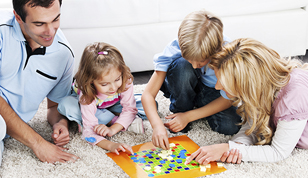Blog Categories
Search Blog
Blog Categories
Roll the Dice and Break the Ice
Playing group games with your family is a wonderful way for your child to learn new words, understand turn-taking vocabulary, and develop his/her language in a safe and fun environment. For preschool children who will soon be entering a classroom setting, practicing the social aspects of group games can prepare them for play with their peers. For school-age children who are already exposed to play with peers, family group games can give them a chance to practice their language and turn-taking skills in a way that can help to enhance their play at school.
Choosing a Game: Parents often ask how to select games that will be rich in language-learning opportunities. There is no specific formula for selecting games, other than a couple of key factors. Of primary importance is that the game is interesting to your child! When a child is interested in a game, he/she will be more engaged in the game, and therefore, more likely to attend to new vocabulary and other learning moments. Another important factor is that the game involves an opportunity for social interaction and turn-taking, such that your child has a chance to listen to new vocabulary being modeled during your turn and to use that vocabulary during their turn.
Here are some language-building tips that will help to make group games an educational experience for you and your family.
1. New Vocabulary
Group games afford the opportunity to model an abundance of new vocabulary.
- Verbs such as roll the dice, pass the dice, move your piece, jump ahead, and others will expose your children to new action words.
- Nouns such as the colour of the game pieces and the numbers on the dice can be modeled and emphasized.
- A great way to teach adjectives is to draw your child’s attention to the physical and tactile aspects of the game pieces and game board, with vocabulary such as colourful, bright, bumpy, smooth, big, and small.
2. Social Turn-Taking Language
Introducing your children to different turn-taking phrases can help them to engage with the other players of the game. Using phrases such as “my turn” and “your turn” and commenting phrases such as “I got ___” and “you got ___” is a great way to expose them to the social aspects of group play.
3. Sequencing Concepts
Group games often involve a series of steps that can be used as a way to teach sequencing and temporal concepts. Using vocabulary such as first, next, and last, as well as before and after, can be a great way to teach these concepts. For example, “first we roll the dice, next we move our game piece, last we give the dice to the next player”. You can even create a visual representation of these steps and practice using sequencing vocabulary while reviewing the game rules.
4. Asking and Answering WH-Questions
Several open-ended questions can be modeled and targeted during group games.
- Who questions can be used to discuss the players of the game. For example, “who wants to go first?” and “who is next to take a turn?”
- What questions can be used to discuss different aspects of the game. For example, “what number did you roll?” and “what is the next step?”
- Where questions can be used to discuss the location of the game pieces on the game board. For example, “where do we start?” and “where does your game piece go now?”
- When questions can be used to discuss the timing of the game. For example, “when does the game end?” and “when do I have to skip a turn?”
- How and Why questions can be used to discuss more complex aspects of the game, such as “how do we decide who goes first?” and “why does the game need four players?”
5. Managing Conflict using Verbal Means
Playing group games at home can be a great way to help your child learn appropriate ways to manage conflict that might arise during play with their peers. Discussions around how to handle when another player attempts to take an extra turn or tries to move their game piece more spaces than what the dice indicates, can be very helpful. Using vocabulary such as “we each take one turn” and “we have to follow the dice” can be modeled and used to manage conflicts and reinforce game rules in a socially appropriate way.
With these tips, playing family group games can be a great way to expand your child’s expressive language, receptive language, and social communication skills. Keeping games fun and interactive is always the best approach – enjoy!






